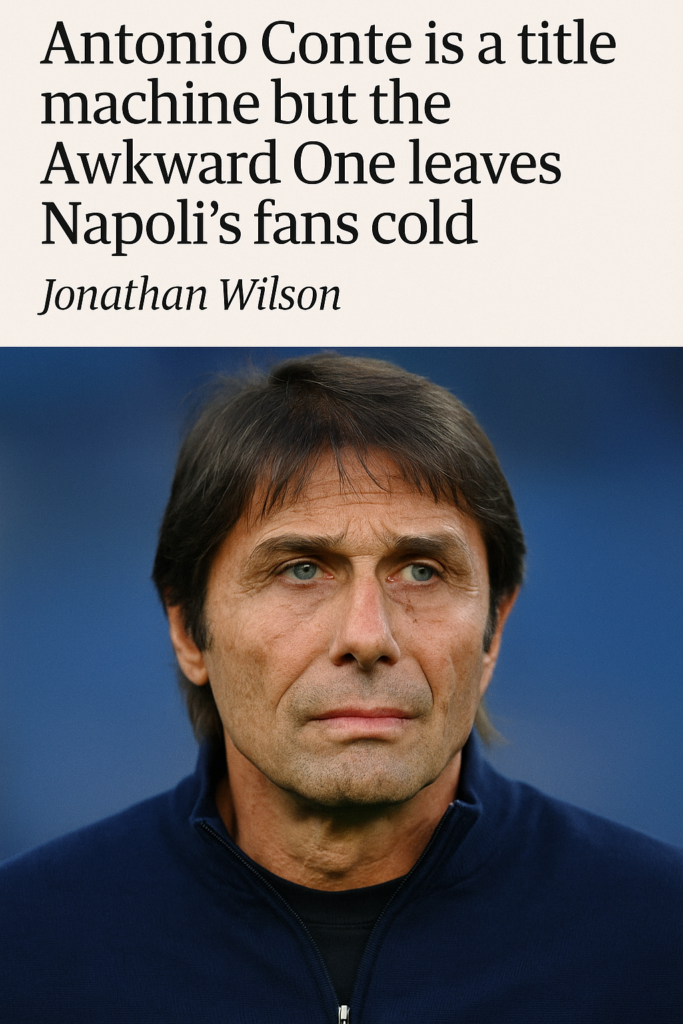Antonio Conte is often seen as a title machine, a manager whose success has followed him from club to club. Since beginning his managerial career with Siena in 2011, Conte has won league titles with Juventus, Chelsea, and Inter Milan. As of now, his Napoli team leads the Serie A title race, with just three games remaining, positioning him to claim his sixth league title with four different clubs in just over a decade. His track record is undeniably impressive, but his tenure at Tottenham Hotspur left much to be desired, marking a rare failure in his otherwise successful career.
Conte’s time at Tottenham was marked by tension and disappointment. Despite achieving a fourth-place finish in his first season, his relationship with the club soured, and he eventually left in March 2023, after a disastrous end to his tenure. His infamous outburst after a 3-3 draw against Southampton, where he criticized the club’s history of failure under the same ownership, showcased the deep frustration he felt. His departure from Tottenham, like many of his past exits, was laced with bitterness and unresolved tension. Yet, this was an exception; at every other club, he left having delivered trophies, establishing himself as a serial winner.
Conte’s tactical acumen is without question. He is known for his adaptable approach, particularly with his use of a back three, which he utilized at the start of his season with Napoli. However, following some key signings, including Scott McTominay, Billy Gilmour, and Romelu Lukaku, he shifted to a 4-3-3 formation. McTominay, who has thrived in this system, has been a standout player, scoring 11 league goals and earning a cult status among Napoli’s fans. His role in the midfield has been pivotal, and he has been instrumental in Napoli’s surge to the top of Serie A.
Despite the tactical success and the growing cult of McTominay, Conte’s relationship with the Napoli faithful remains distant. In a city where Maradona’s legacy looms large and where fans have always had a deep connection with their managers, Conte’s presence feels coldly transactional. There is no warmth between him and the supporters, even though he has guided the team towards a potential scudetto. The relationship between Conte and Napoli’s president, Aurelio De Laurentiis, has also been strained. Conte’s recent complaints about the club’s inability to fulfill his demands were clearly aimed at the president, continuing a pattern seen throughout his managerial career.
Conte’s managerial style is both his greatest strength and his greatest weakness. His intense passion and drive for success have propelled him to the top of the managerial ranks, but they have also led to constant friction with club owners, directors, and even players. His demanding nature creates a pressure cooker environment that often results in burnout or early exits. This dynamic has led many to admire his results while avoiding deep affection for him as a figure.
At Napoli, despite leading the club to a potential fourth scudetto, Conte’s time is expected to be short-lived. The club’s ultras, known for their passionate support, are not particularly fond of him, and rumors suggest that De Laurentiis is already looking at potential replacements, including Massimiliano Allegri and Francesco Farioli. Conte’s fiery temperament, while delivering success, often overshadows the celebrations, making it difficult for him to form lasting, affectionate connections with his teams.
While his achievements speak for themselves, Conte remains a manager who is hard to love. His legacy will likely be defined by his tactical brilliance and the many trophies he has won, but also by the tumultuous relationships that have followed him wherever he has gone. For Napoli, he may secure another league title, but his time in the city is destined to end as it always does with tension, drama, and a sense that his work is done before it is truly embraced.

